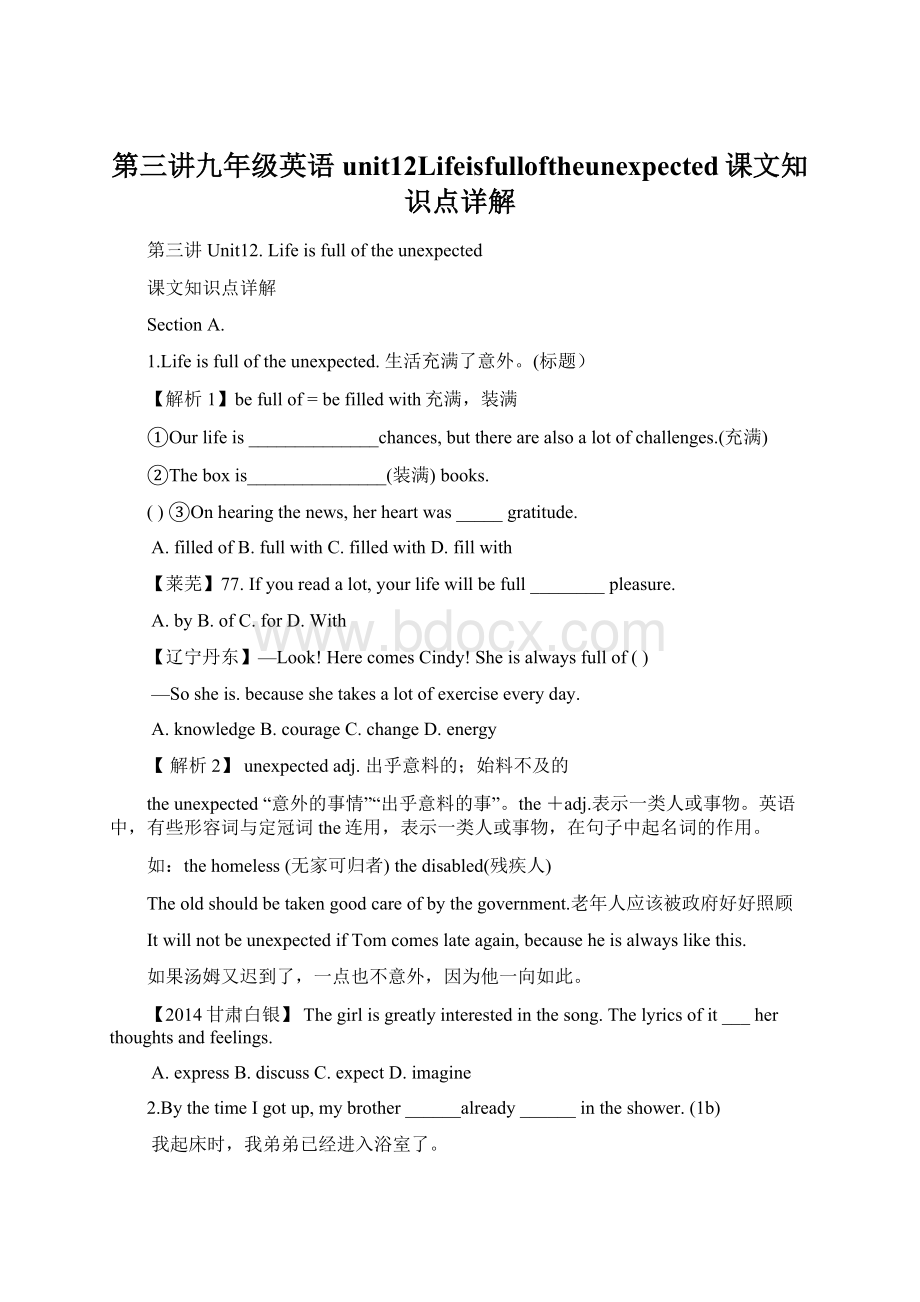第三讲九年级英语unit12Lifeisfulloftheunexpected课文知识点详解.docx
《第三讲九年级英语unit12Lifeisfulloftheunexpected课文知识点详解.docx》由会员分享,可在线阅读,更多相关《第三讲九年级英语unit12Lifeisfulloftheunexpected课文知识点详解.docx(25页珍藏版)》请在冰豆网上搜索。

第三讲九年级英语unit12Lifeisfulloftheunexpected课文知识点详解
第三讲Unit12.Lifeisfulloftheunexpected
课文知识点详解
SectionA.
1.Lifeisfulloftheunexpected.生活充满了意外。
(标题)
【解析1】befullof=befilledwith充满,装满
①Ourlifeis______________chances,buttherearealsoalotofchallenges.(充满)
②Theboxis_______________(装满)books.
()③Onhearingthenews,herheartwas_____gratitude.
A.filledofB.fullwithC.filledwithD.fillwith
【莱芜】77.Ifyoureadalot,yourlifewillbefull________pleasure.
A.byB.ofC.forD.With
【辽宁丹东】—Look!
HerecomesCindy!
Sheisalwaysfullof()
—Sosheis.becauseshetakesalotofexerciseeveryday.
A.knowledgeB.courageC.changeD.energy
【解析2】unexpectedadj.出乎意料的;始料不及的
theunexpected“意外的事情”“出乎意料的事”。
the+adj.表示一类人或事物。
英语中,有些形容词与定冠词the连用,表示一类人或事物,在句子中起名词的作用。
如:
thehomeless(无家可归者)thedisabled(残疾人)
Theoldshouldbetakengoodcareofbythegovernment.老年人应该被政府好好照顾
ItwillnotbeunexpectedifTomcomeslateagain,becauseheisalwayslikethis.
如果汤姆又迟到了,一点也不意外,因为他一向如此。
【2014甘肃白银】Thegirlisgreatlyinterestedinthesong.Thelyricsofit___herthoughtsandfeelings.
A.expressB.discussC.expectD.imagine
2.BythetimeIgotup,mybrother______already______intheshower.(1b)
我起床时,我弟弟已经进入浴室了。
3.BythetimeIgotoutside,thebushadalreadyleft.当我出来时,公共汽车已经离开了。
(1b)
【解析】bythetime在……以前,指从
过去的某一点到从句所示的时间为止,常引导表示过去的时间状语从句,主句常用过去完成时,即had+动词过去分词。
如:
BythetimeIgotup,hehadalreadyleft.当我起床时,他已经离开了。
①BythetimeI________(walk)intotheclassroom,theteacher__________(start)________(teach)already.
②BythetimeIgotoutside,thebus_________already________(leave).
()③____thetimeIheardthenoise,ithadalreadygone.
A.ByB.WhenC.At
()Bythetimeoflastterm,we______allthelessons.
A.finishedB.havefinishedC.hadfinishedD.willfinish
【甘肃兰州】Ioversleptthismorning.BythetimeIgottothetrainstation,thetrain________(leave).
【山东枣庄】BythetimeIlockedthedoor,IrealizedI___mykeysathome.
A.hadrepairedB.hadchangedC.hadforgottenD.hadleft
【拓展】bynow表示“到现在为止”,通常与现在完成时连用。
BynowIhavecollected200dolls.到现在为止,我已收集了二百个布娃娃。
4.WhenIgottoschool,IrealizedI_____mybackpackathome.(1b)
当我到学校时我意识到我把书包忘在家里了。
【解析】leavesth.+地点“把某物忘在某处”
forget意为“遗忘某物”,指忘记一件具体的东西,但不能有具体的地点。
I left my book on the desk. 我把书忘在了桌子上。
I forgot my umbrella yesterday .我昨天忘了带伞。
【辨析】leave与forget的用法:
(1)leave“遗留,落下,忘记带”,侧重指把某物或某人留在某个地方,后常跟地点状语;
(2)forget“忘记”,侧重指忘记某件事情,后常跟todo(忘了要去做)或doing(忘了做过)。
【拓展】
♦leave→left→leftv离开
(1)leavesth+地点把某物遗忘在某地
(2)leavefor+地点离开去某地
(3)leaveamessage留言askforleave请假leaveschool(中学)毕业
(4)leaveonebyoneself=leavesbalone把某人单独留下
【注意】英语中表示“把某物遗忘在某处”常用leave+地点,而不是forget+地点
如:
Unluckily,Ileftmybookathome 不幸的是,我把书忘在家里了。
【延伸】动词leave的第三人称单数形式为leaves;而名词leaf的复数也是leaves.
【广西贵港】—LinKai,handinyourhomework,please.—Oh,sorry.I_____itathomethismorning.
A.wasleavingB.hasleftC.willleaveD.left
【山东枣庄】BythetimeIlockedthedoor,IrealizedI___mykeysathome.
A.hadrepairedB.hadchangedC.hadforgottenD.hadleft
【齐齐哈尔】-I’msorry,Mr.Li.I_____myEnglishhomeworkathome.
-Don’tforget________ittoschooltomorrow.
A.left,tobringB.forgot,totakeC.lost,tobring
5.A:
Whathappened?
发生了什么?
(1c)
B:
Ioverslept.AndbythetimeIgotup,mybrotherhadalreadygottenintheshower
我睡过头了。
等我起来时,我哥哥已经在洗澡了。
【解析】oversleep=sleeplatev睡过头
sleep→slept→slept
oversleep—overslept—overslept
()①–Whathappened?
—I_____.
A.oversleepB.oversleepedC.overslept
()②Myalarmclockdidn’tgooff,soI____.
A.oversleepB.oversleptC.oversleeping
()I___thismorningandmissedtheearlybus.
A.oversleptB.sleptC.heldD.caught
6.WhenIgothome,IrealizedIhadleftmykeysinthebackpack.(2b)
当我到家时我意识到我把钥匙忘在背包里了。
【解析】leave在此处做及物动词,“留下”。
“leave...+地点”表示“把某物落/忘在某地”。
如:
Ileftmyhomeworkathomethismorning.我今天早晨把作业忘在家里了。
(1)leave用作及物动词,其用法有
①表“离开”。
leave...for...意为“离开某地前往某地”。
如:
TheGreenswillleaveBeijingforLondonnextweek.格林一家下星期离开北京去伦敦。
②表“剩下”Howmuchtimeisthereleft?
还剩下多少时间?
③表“辞去(工作等);脱离(组织等)”。
如:
Maryleftschoollastyearandsheisworkinginashopnow.
玛丽去年退了学,现正在一家商店工作
(2)leave也用作不及物动词,意为“去,出发”。
如:
It'stimeforustoleave.我们该走了
注意:
表示把某物落/忘在某地,不能用forget,要用leave。
()--Boys and girls!
Please ____ your compositions after class.
--Oh, my God!
I ____ it at home.
A. hand in; forgot B. hand in; left C. hand out; forgot D. hand out; left
7..BythetimeI_____(get)backtoschool,thebell____(ring).(2b)
【解析】getbacktoschool意为“回到学校”
【解析】
(1)getbackto后接表地点的名词,意为“回到某地”;
(2)getbackto后面接人,可引申为“回复某人的信件,电子邮件,电话”等
;
(3)getback还可表示“回来,返回,拿回,取回”等含义。
【广东佛山】Welostthewayintheforest,andwedidn’tknow.()
A.wherewegetbackB.whendidwegetbackC.howwecouldgetback
8.My alarm clock didn’t go off!
我的闹钟没响。
(2d)
【解析】gooff发出响声, (闹钟)闹响 如:
Thealarmwentoffjustnow.刚才警钟响了
【短语】goover复习goaway离开goby(时间)过去goforawalk出去散步
gofishing/shopping/skating/swimming去钓鱼/去买东西/去溜冰/去游泳
例:
()Iwaslatetodaybecausemyalarmclockdidn’t____
A.runoffB.gooffC.giveoutD.giveup
9.SoIjustquicklyputonsomeclothesandrushedoutthedoor.(2d)
【解析】rushout冲出去,冲出……
如:
Henryrushedouttheroomanddisappearedintherain.亨利冲出房间,消失在了雨中。
Juliarushedoutanddidn’treturn.朱丽叶冲了出去,再没回来。
10.Carl’sdaysawmeonthestreetandgavemealiftinhiscar.Carl的爸爸在街上看到我,捎了我一程。
(2d)
【解析】 give sb. a lift =give sb. a ride / give a ride to sb. “捎某人一程”,
()Thepooroldwomanwasstandinginthemiddleoftheroadandaskedsomeoneto___.
A.givehimarideB.giveherarideC.enjoyarideD.acceptaride
()Tomdrovebyandgavemea_____onthewayhome.
A.flightB.RunC.walkD.lift
11.IwasabouttogoupwhenIdecidedtogetacoffeefirst.(3a)我正要去办公室时,我决定先喝一杯咖啡。
【解析】beaboutto忙于;即将做某事。
侧重于表示动作马上就要发生,常与when引导的从句连用,但不与具体的时间状语连用。
()Hurry up, Tom!
The train is _____ to start.
A. about B. withC. for D. At
12.Iwenttomyfavoritecoffeeplaceeventhoughitwastwoblockseastfrommyoffice.
我走向我最喜欢的咖啡馆,尽管它在我的办公室东面有两个街区远。
(3a)
【解析1】eventhough即使,虽然,尽管,用于引导让步状语从句。
()I don’t like vegetables ____ they are good for my health.
A. because B. even though C. after all D. so that
【浙江丽水】____Frankleftschoolat16,hestillbecomeasuccessfulwriter.
A.EversinceB.InfactC.AfterallD.Eventhough
【拓展】evenif/eventhough/though三者都可以引导让步状语从句。
Evenif=eventhough“即使、纵然”引出的从句叙述的是假设或把握很大的事情
though“虽然”,引出的从句叙述的是事实。
IwilltryevenifImayfail.即使失败,我也要尝试一下。
Thoughitwasverylate,hewentonworking.虽然很晚了,他还继续工作。
[注]though和but不能同时出现在句中。
()【江苏无锡4】Onthosefoggydays,youcouldhardlyseeanythingaroundyou___itwasatnoon.
A.soB.becauseC.butD.though
()【河北】Ericarrivedontime,______itwastherushhour.
A.althoughB.becauseC.whileD.unless
()【南京】______LinFenghastoworklate,shealwayswearsasmileonherface.
A.BecauseB.IfC.UntilD.Though
13.AsIwaswaitinginlinewithotherofficeworkers,Iheardaloudsound.
当我和其他的工作人员排除等候时,我听到了一声巨响(3a)
【解析】waitinlinewith意为“与……排队等候”。
standinline站成一排cutinline插队
【解析2】soundn“声音;声响”。
【辨析】sound,voice与noise
sound含义广泛,指一切可以听到的声音,包括有意听到的和无意听到的。
如:
Atmidnightheheardastrangesound.半夜里他听到一种奇怪的声音。
voice指说话及唱歌的声音,多用于指人的嗓音。
如:
Thegirlhasabeautifulvoice.这个女孩有美丽的嗓音
noise特指噪音和吵闹声。
如:
Thenoiseoftraffickeptmeawake.交通的噪音使我睡不着。
()【烟台】—Wouldyoumindnot_____noise?
Aliceissleeping.
—Sorry,Ididn’tknow.I________shewasawake.
A.make,thinkB.making,thoughtC.making,thinkD.make,thought
()【甘肃白银】Theboydidn’tsleepwelllastnightbecauseofthe______fromthefactory.
A.voiceB.noiseC.musicD.song
14.Westaredindisbeliefattheblacksmokerisingabovetheburningbuilding.(3a)
我们难以置信地看着燃烧的建筑物升起的黑烟。
【解析1】starev.盯着看,凝视(表示看得比较仔细,有时候也带有吃惊的意味去看,常与at,into连用。
)
如:
Don’tstareatmelikethat.别那样盯着我看。
【解析2】indisbelief不相信,疑惑,怀疑
如:
Tamarastaredathimindisbelief,shakingherhead.塔玛拉一边狐疑地盯着他看,一边摇着头。
如:
Shelookedathimindisbelief.她全然不信地看着他。
【解析3】above
1)prep(表示位置)在…正上方;高于”。
(与below相对)
如:
The moon is now above the trees.月亮正位于树梢上。
2)prep表示在地位、级别、能力、资历、重要性等方面“超过”
如:
Heisabovemeineveryway.他各个方面都比我强。
3)adv.“在上面; (级别、数目等)更高;更大;更多;在上文”。
如:
See the examples given above.见上述例子。
()Ice is not often seen here in winter as thetemperaturenormally stays ____ zero.
A. up B. down C. above D. below
【拓展】above/over/on辨析
【相同点】方位介词,“在……之上”
【不同点】
1)above着重指:
在……上方,不一定含有垂直在上的意思。
反义词为:
below.
如:
Thesunroseabovethehorizon.太阳升到了地平线上。
2)over表盖在…上面或铺在……上面。
此时不能用above.代替。
含有垂直在上的意思。
反义词为under.
如:
Spreadthetableclothoverthetable.把桌布铺在桌子上。
3).on含有与表面相接触的意思。
如:
Thebookisonthedesk.
【扬州1】—Thisproblemisfar______me,I’mafraidIcan’tworkitout.
—Don’tworry,wewillhelpyou.
A.beyondB.besideC.behindD.Between
【湖北鄂州—Shesoldhertreasurestocurehermother’sillness,eventhoughitwasherownwishes.
—It’ssokind_____her.
A.against;ofB.above;ofC.on;forD.for;for
【解析4】burnv.着火,燃烧(burnt,burnt/burned,burned)
burningadj.着火的;燃烧的
如:
Hewastrappedinaburninghouse. 他被困在正在燃烧的房屋里。
()Teachers are often compared to _____ candles.
A. burnt B. is burning C. burns D. burning
【拓展】
burn away烧掉
burn down 渐渐烧完
15.Ifeltluckytobealive.我感到很幸运能活下来。
(3a)
辨析:
alive,living,live与lively
alive
活着,“活的,有生命的,还出气的
可指人也可指物
表语,后置定语,宾补
living
活着,尚在人间,健在的
指人或物
定语或表语
live
活着的,活生生的
指物,不指人
定语
lively
活泼的,活跃,充满生气的
可指人,也可指物
定语、表语或宾补
()1.JinYongisoneofthegreatestandoldestwriter.H